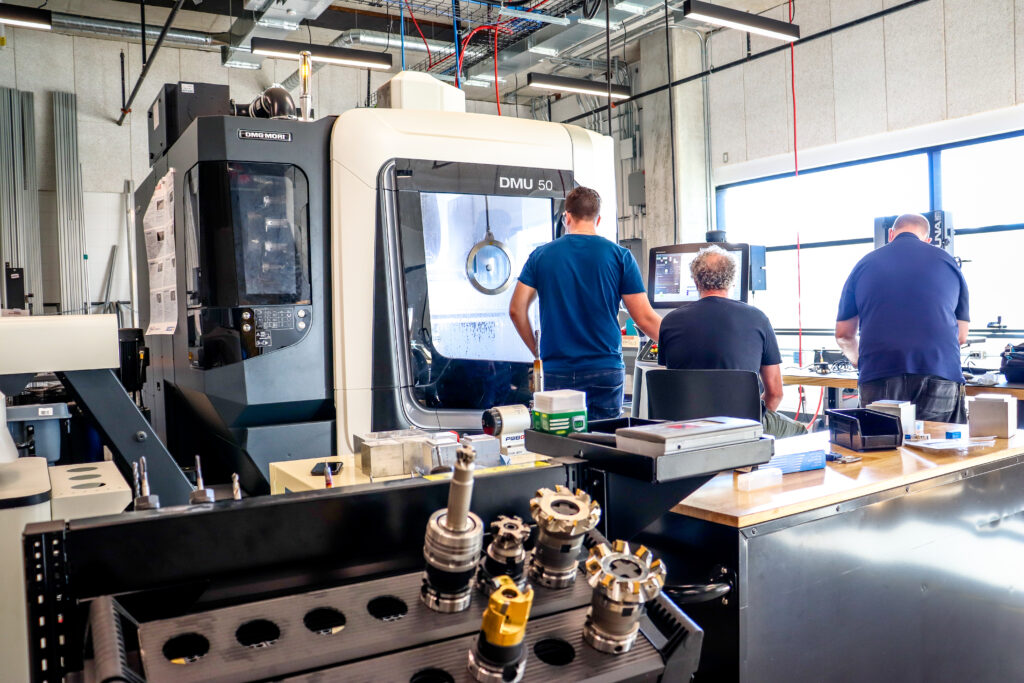
Learning 4.0: Using the tools of today for a better tomorrow
March 7, 2023
By Stevano Setiadi
 The DMG Mori lab at Humber College’s Barrett Centre for Technology Innovation. (Photo: DMG Mori)
The DMG Mori lab at Humber College’s Barrett Centre for Technology Innovation. (Photo: DMG Mori) Working together builds progress. This was the primary motivating factor behind DMG MORI’s decision to partner with Humber College in 2018. The focus of this partnership is to provide students with the tools necessary to support them in their learning and develop their abilities prior to entering the manufacturing sector. Through this partnership, the company is investing in solutions to meet the skilled labour needs that the Canadian manufacturing sector requires today.
As part of this investment, DMG MORI has installed cutting-edge machine tooling technology at its lab in the Barrett Centre For Technology Innovation (Barett CTI). This includes a DMU50 5-axis simultaneous CNC Machining Centre with a control system that is Industry 4.0 ready to support data management. The 5-axis CNC machine is used to create prototypes for innovative projects
Through its innovation lab, DMG MORI is helping to create education and employment pathways and recruitment opportunities for Humber’s students and graduates. The lab is used to support applied research and capstone projects that help SMEs tackle their challenges, particularly around prototyping work pieces and metal fabrication.
The partnership has several other value additions. The company is constantly collaborating with Humber and the BCTI on STEM outreach activities. Encouraging the future workforce is as essential as training them with the tools of the future. For this purpose, the company is involved in several student awards and scholarships, including the DMG MORI Awards.
A focus on productivity
A good manufacturer is only as good as its tools. With more automation being adopted, it’s necessary to make sure that business equipment is running optimally.
As an example, DMG MORI’s Conditional Analyzer app is the hub for all its monitoring technologies. This includes Machine Protection Control (MPC) which detects machine vibrations due to wrong part setup and incorrect workpiece overhang or from tool wear. With MPC, the machine can shut down or switch over to a sister tool to improve the process, avoiding premature spindle wear or chatters on the workpiece. By installing monitoring technologies, companies can prevent downtime and costly repairs to their machinery.
The increasing number of automation possibilities is why DMG MORI felt it was important to work with Humber College. The team is supporting Humber College with an upcoming project using the company’s existing DMU 50 third-generation 5-axis milling machine. The goal is to create a small-scale manufacturing plant within the Humber College facility that can assemble components to build a final product. The DMU 50 can be used to produce fixturing to clamp down components or tooling and to help make special tools required on the assembly line to assemble the products. Including capstone projects, the DMG MORI team at the Barrett CTI has collaborated on several training and industry workshops aimed at Humber faculty and staff as well as external industry participants.
Tools for the workforce
Humber College equips its students with the proper skills needed to enter the manufacturing workspace. Through its innovation lab, DMG MORI provides experiential learning opportunities to students that will reflect work in the real world. To be able to do that, students need to work confidently with the tools of today. Those tools must be able to meet the performance needs of students and businesses reliably. This is especially true as automation becomes a mainstay of manufacturing processes.
Through its innovation lab, DMG MORI is preparing Humber’s students for careers that involve hands-on experience, equipping them with the underlying foundational knowledge required to conceive, design, manufacture and operate CNCs. The lab prepares students for careers in programming (CNC) machine tools using computer-aided manufacturing (CAM) software. Students acquire knowledge in areas related to mechanical design, advanced manufacturing technologies, design of engineering systems, mechanical maintenance and modelling, among other things.
The future is built with the hands of today. The specialized world of machine tools is globalized now. The company understands the need to collaborate with industry and education partners to identify new ways to improve productivity.
Working with the Barrett CTI builds on DMG MORI’s long relationship with Humber. It creates the opportunity to work with different stakeholders to help make Canadian manufacturing competitive in the global market.
Stevano Setiadi graduated from Humber College in 2016, specializing in electromechanical engineering. With his knowledge in robotics, automation, control circuits, hydraulics, pneumatics and mechatronics, he was hired by DMG MORI Canada as a service technician right out of college. He is currently the product sales manager for 5-axis milling for the company’s North American division.
Advertisement
- OTTO Motors features on Fast Company’s 2023 list of innovative robotics companies
- CME concerned over lack of support for manufacturers in B.C. budget